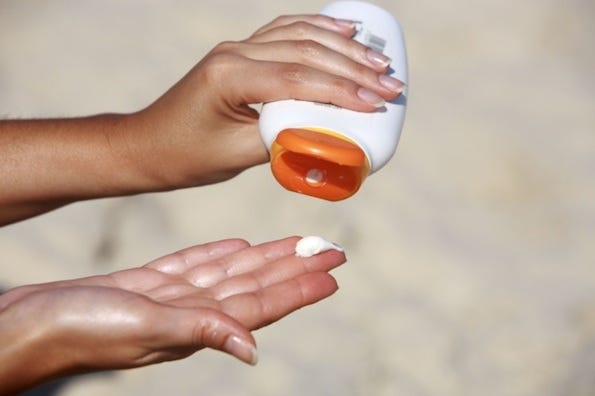When it comes to sunscreen, is natural always better?When it comes to sunscreen, is natural always better?
Could safe chemicals be the next big thing in "natural" sun care? The Sunscreen Innovation Act, which President Obama recently signed into a law, could be a game changer for this hot category.

 Mineral vs. chemical. This sunscreen debate is one that I am constantly refereeing, and fine I'll admit it: I am a little biased in favor of mineral. However, that comes from doing extensive research; I believe the facts support the benefits of natural/mineral over conventional/chemical.
Mineral vs. chemical. This sunscreen debate is one that I am constantly refereeing, and fine I'll admit it: I am a little biased in favor of mineral. However, that comes from doing extensive research; I believe the facts support the benefits of natural/mineral over conventional/chemical.
Writing a recent piece on this very topic (it doesn’t get much more exciting than a sun care face off, eh?) reinforced to me all of the areas where mineral has an edge: full-spectrum coverage, effective nontoxic ingredients that nourish your skin rather than potentially harm it and long-lasting wear. Where mineral sunscreens could use a little bit of help, despite some excellent recent advances by top nontoxic brands, is with sheer application, as chemical products still tend to be superior there, and this is my number one challenge in making natural recommendations that satisfy consumers’ needs.
Needless to say, there is a lot to consider in the sunscreen conversation, and the late-2014 announcement of President Obama signing the Sunscreen Innovation Act into a law is going to make the topic even more complex and important. TIME magazine even ranked this among its 11 remarkable health advances from 2014.
Sun care in the age of the Innovation Act
Most of the brands in the “natural” products space use minerals zinc oxide or titanium dioxide, or chemical avobenzone—all of which are given a very good (safe) rating by the Environmental Working Group (EWG).

When it comes to sunscreen, is natural always better? http://ow.ly/HIQhk
But more chemicals could be entering the “safe sunscreen” world, according to Nneka Leiba, the EWG’s deputy director of research. In a recent interview, she noted that while the organization almost always recommends mineral sunscreens, that could change as a result of the new law. Why? Some less caustic and more effective chemicals (much better than oxybenzone, which the EWG gives an epic fail 8/10 hazard ranking) that have been used internationally for years will now finally be approved for use in the U.S.
While I still think minerals zinc and titanium will reign supreme when it comes to safety and efficacy, I am also excited to see which new ingredients hit the market. I would recommend all manufacturers and retailers stay on top of these developments to determine which ingredients should make the cut in their formulations and ultimately land on store shelves.
The big question: Is natural always better?
For me, this ties into a couple of important themes that we face as an industry.
a.) What makes an ingredient or product fit for “natural” retail, anyway?
b.) Is said “natural” always superior?
In doing research around the topic of green chemistry, I have become convinced that is still a major need for us, as an industry, to recognize when chemicals are actually safe. Could sun care be one area that makes this conversation even more relevant?
Yeah, there, I said it: Maybe sometimes natural isn’t always the only way to go, but it will certainly be a fine line. And, if we use more of these safe chemical ingredients, such as in sun care products, can we still call ourselves the "natural products industry"?
About the Author
You May Also Like





